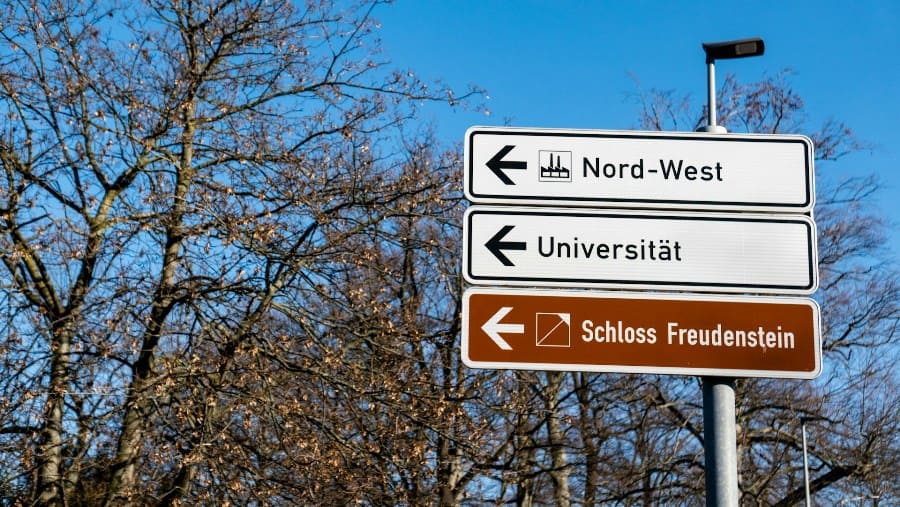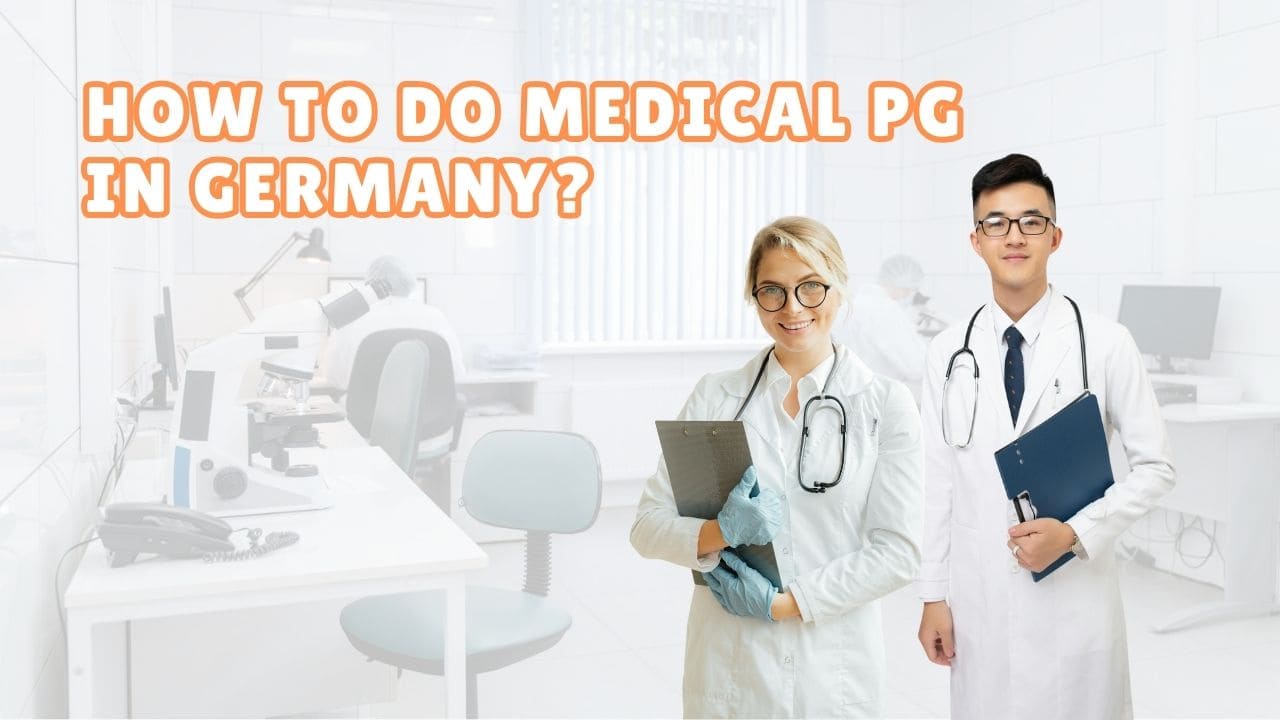Is Indian MBBS Valid in Germany?
Yes, however an Indian MBBS degree is accepted in Germany, practicing medicine in Germany is only possible for Indian doctors provided they comply with certain requirements. They need to show their German language skills as well as may need to take exams including the Approbation exam in order to welcome the opportunity to practice medicine after receiving a license.
Besides, although some may be in a position to join the German system of medical education as lateral entrants, they will have to reckon with the possibility of further training and/or evaluation in relation to their recognized qualifications.
How to do Medical PG in Germany?
Eligibility Criteria for medical PG in Germany after MBBS
The pursuit for medical postgraduate degree (PG) in Germany on completing an MBBS from India does not only end at education qualification. Below is a detailed account of the eligibility requirements that can be mentioned :
1. Medical Degree Recognition
- Equivalent Degree: Any candidate who is seeking admission for PG study must possess at the very least an MBBS degree or degree of equivalent status from any institution of recognition. Such degree needs to be regarded as that which is equal to having obtained a German medical degree so as to be eligible to postgraduate studies.
- Approbation: Graduates seeking to practice in Germany will also have to secure an Approbation, or a full medical license. This may include submission of educational documents for assessment purpose and where necessary, taking the Kenntnisprüfung (KP) to cover up for any deficit in education.
2. German Language Proficiency
- Language Levels: The knowledge of German language is important where most programs requests at least the provision of B2 level certificate as standard minimum cutoff mark. However, a more preferable option would be having candidates with a C1 level proficiency.
- Medical Language Exam: Candidates should take the Fachsprachprüfung (FSP) which evaluates the medical language required for explanatory communication with patients as well as other health professionals.
3. Clinical Experience
- Hospitation: While it is not always compulsory, participants are encouraged to undergo clinical observership in hospitals (Hospitation) as this will improve their chances of securing an admission. This enables candidates to learn about the German healthcare system as well as practicing the language further.
4. Academic Performance
- Minimum Marks Requirement: In most case scenario, candidates possess a minimum aggregate mark of about 50% in MBBS or its equivalent degree. A few universities could have a bit more cut off trace or other expectations from candidates because of competitiveness.
5. Entrance Examinations
- Kenntnisprüfung (KP): KPs might be compulsory for candidates who wish to practice in Germany whose medical education has not been fully accredited to be equivalent German standards which evidenced their medical comprehension as well as comprehension of the German healthcare system.
6. Additional Requirements
- Work Experience: Some medical universities may be wary of candidates who do not have medical work experience prior to application, more so for some vast specializations.
- Specialization-Specific Tests: Additional entrance examinations or requirements may exist because of chosen specialty.
It can be safely stated that a MBBS from India is valid and can be practiced in Germany. They can especially look up to the German medical training institutes as they meet all the necessary prerequisites. However, successful applicants will have to be proficient in German as well as take language exams and possibly with a clinical observership.
Documents required for Medical PG in Germany
To obtain a medical postgraduate degree (PG) in Germany, the candidates have to work on a variety of their documents. The following is an insightful outline of the essential documents required during the admission process.
Required Documents for Medical PG in Germany
- Passport
- The original and photocopy of the passport must be valid throughout the duration of the stay.
- High School Educational Certificates
- In both hard and soft form, certificates of all marks obtained in 10th and the certificate of the twelve may be required.
- MBBS Degree Certificate
- Officially recognized original MBBS degree with at least one photocopy.
- Migration Certificate
- There are cases when people change their educational boarding so in that context this may be relevant.
- Language Proficiency Certificates – German for PG DNB or MD or MS course
- Documentary evidence for the Bk level and above for Germany proficiency must also be presented through any of the language tests like TELC, or TestDaF.
- Medical Certificate
- Issues regarding a comprehensive health assessment certificate and reports on immunization for example (HIV) and medical eligibility must be submitted.
- Birth Certificate in English if possible
- Submission of the applicant\’s certificate at the request for ID or legalisation.
- Passport size photographs of recent time
- Passport should accompany these recent passport photos depicting the qualifications set by the universities.
- Bank Statement for Medical PG in Germany
- Bank statements for guardians or sponsors specifying their ability to provide adequate resources for living and possible payments to university(s).
- Offer Letter
- A formal offer letter from the German university or an institution where you are going to pursue your PG program.
- Completed Application Form
- The form for application which has been completely filled in as well as gives all the requisite details with all necessary declarations.
- Translation of Documents
- Copies of your passport and a birth certificate or any other necessary academic certificate translated in German and notarized by a legal officer to be submitted to the university if requested.
- Code of Conduct Certificate
- A document issued by any competent authority showing the Codes of ethics have not been violated if it is required.
- Video Interview Submission
- There are programs wherein an applicant will be required to submit a video recording in which he or she explains their motive and background for wanting to get the particular degree.
- Travel Documents
- Evidence that there is a travel booking, like flight tickets is sometimes demanded during application for a visa.
Ascertaining that all documents have been presented accurately within the right time frame is very important for those applicants hoping to be joined with programs specially medical PG in Germany. It is up to the candidates to ensure they have scrutinized the documents to conform to the stated requirements of the university so as not to face hardships.
Fees for pursuing Medical PG in Germany | Expected Costs for Medical PG in Germany
A Medical Post Graduation Degree (PG) in Germany attracts many international students, especially because of the financial structure of the programs. Here’s a detailed breakdown of the expenditures and other costs related to medical PG in Germany.
1. Tuition fees
- Public Universities: Respective bodies do not charge medical residency programs tuition fees in Germany most of the time. This renders education almost free to many international students since most of them do not have to incur huge debts for professional training as they would do in their home countries.
- Private Universities: These international students would however incur tuition costs in private universities if they chose this option which have fees of approximately €13,000 to €30,000 (about ₹10,50,000 to ₹24,00,000) per year depending on the type of program and particular university.
2. Living Costs
- Monthly Expenditure: As reported above, there are no tuition fees for public universities however appreciation cost should be met as here the expenditures are from €800 – €1,200 (approximately ₹65000- 98000) in a month. This will encompass accommodation, food, transportation, personal expenses and others valued at such a cost.
- Annual Total: In a year, the range for lifestyle and location factors can rough around €9,600- €14,400 (around ₹785,000- 1180,000) as this can broadly account for most areas of Germany when generally speaking.
3. Health Insurance
- Mandatory Coverage: Health insurance is mandatory for all students in Germany. The student health insurance generally costs between 80 euros and 160 euros per month which is around ₹6,500 to ₹13,000. This is an unavoidable expenditure that has to be incorporated in the overall budget.
4. Language Proficiency Exams
- Exam Fees: Candidates are usually requested to take a language test such as TestDaF or DSH. Their fees can be rather different but generally are considered to fall within €150 to €300 which is approximately ₹12,000 to ₹24,000 depending on testing centre and location.
5. Translation and Certification Costs
- Document Translation: International students are required to have their educational certificates in German. This can cost anywhere between 50 euros and 100 euros per document page.
- Notarization: Furthermore, every translated document may also need to be notarized (Beglaubigung) which has its own costs.
6. Licensing Fees
- Approbation and Berufserlaubnis: Graduates after completing their PG training from Germany would be required to register for a medical license (Approbation) in order to practice medicine. The Application fee for this license can be around between €500 to €1000 which is about ₹40,000 to ₹80,000 depending on the states where the application is made.
7. Monetary Gains while in Residency
- Compensation/Salaries/Stipends: It has been observed that German medical trainees are paid over a period of training. This amount is in the range of € 4,500–5,500 per month. This amount can be said around ₹ 3,70,000 – 4,50,000. Most of the time this amount also helps to meet the basic subsistence during training.
A medical post graduate in Germany appears to be an economically prudent strategy as there is no cost of private education at state institutions. Students must, however, make provisions for living costs as well as additional expenses such as medical cover, license fees, etc. With the residency program’s payment method and fee structures, there is no way but for graduates to earn a good amount of money and a great deal of experience in one of the most developed health care system.
German Work Visa and its conditional requirements
In case an international applicant wishes to move to Germany and finds employment there, it is mandatory to obtain a German work visa which also has particular eligibility requirements. These are the important points related to the visa issuance process and its eligibility criteria:
1. Basic Conditions Of Eligibility
- Recognition of Qualifications: Applicants are required to have their foreign qualifications either recognized in Germany or proven to be equivalent to a Germany degree. This is necessary for specific fields especially regulated health professions.
- Offer of Employment: An offer issued by a German employer must be binding. The job must be suitable, relevant to the qualifications and skills of the applicant.
- Proof of Economic Resources: Economic resources sufficient to sustain the applicant during his stay in the territory of Germany should also be shown.
2. Types of German work visas
- Employment Visa: Issued to people that already have job offers in Germany.
- Job Seeker Visa: This enables people to go in to Germany for a period of 6 months to look for a job.
- Self-Employment Visa: This visa is for people who want to incorporate a business in Germany.
3. Required Documents for German Work Visa
- Passport: The passport should have been issued in the preceding 10 years and specifically should have two unutilized pages.
- Visa Application Forms: The applicant is required to sign two forms with his/her specific signature and fill them out.
- Passport Photographs: Recent biometric photographs that meet several specific standards.
- Proof of Employment: An employment contract or a letter of intent by the employer specifying the salary to be paid and job functions.
- Proof of Qualifications: Academic or professional degrees and qualifications supported with their validation in Germany as well.
- Health Insurance: Evidence of health insurance which is valid and obtainable during the time upon arrival is essential.
4. Language Proficiency
- In principle, related to the occupation to which a candidate is training for application, such a requirement of speaking the German language may be necessary. In medical practice, they have to provide evidence of the B1 level most times.
5. Application Process
- Submit Application: Applications for skilled worker or employment visa have to be submitted in the nearest German embassy or consulate.
- Visa Fee: The fee is around €75 and is due upon handing over the application.
- Interview: In respect of the application that a candidate wishes to file, he may be given an interview in regard to his application.
6. Processing Time
- Permitting any alteration in required documentation, the work visa for migrant workers would take anywhere from six weeks to several months. The average would shift closer towards the several months particularly considering exogenous factors as well.
7. Post-Arrival Requirements
- Specifically, within two weeks of their arrival in Germany, the holders of visas must register their address at the local file (Einwohnermeldeamt) and may be required to obtain a residence permit at the local foreigners’ authority (Ausländerbehörde).
International applicants were able to obtain a work visa and seek employment opportunities in Germany by meeting those conditional requirements and the stages of the application.
How to apply for Medical PG in Germany after MBBS?
Step-wise Admission Process for Medical PG in Germany after MBBS
Complete process of admission for Medical Post Graduation in Germany
The important steps to acquire a postgraduate medical degree PG in one of the medical colleges in Germany requires a focused approach and systematic entry requirements. These are the broader steps to be followed while performing this process:

Step 1: Research and Select Universities
- Find courses: Look up the different universities and institutions offering medical PG courses that suit your aspirations.
- Know the requirements: Go through mandatory requirements of admission concerning these programs since it will differ from institution to institution.
Step 2: Language Proficiency
- Familiarize with Learning German Language: Obtain a certificate of A1 or A2 German language proficiency for application purposes though most programs expect a B2 or C1 level.
- Language Certificates: Language certificates such as TELC B2/C1 TestDaF or any other accepted tu which shows your ability to speak and write the language necessary for effective patient interaction and able to take instructions during class.
Step 3: Prepare Required Documents
Make sure to collect all the required supporting documents, among them:
- Current passport
- Academic certificates (10th, 12th, and MBBS)
- Migration certificate (if available)
- Language certificates
- Medical certificate
- Certificate of birth
- Passport size photographs
- Evidence of financial resources (bank statement)
- Application form
- Acceptance letter from the German university
- Documents in German, translated and notorized/certified
Step 4: Recognition of Medical Degree
- Degree Evaluation: Apply for the validation of your MBBS from the appropriate German authorities.
- Kenntnisprüfung (KP): Where necessary, seek to sit and pass the Kenntnisprüfung, which evaluates your medical practice knowledge to the German standard.
Step 5: Apply for Clinical Observership (Hospitation)
- Get the Position: Make an application for clinical observership in a German hospital in order to acquire field experience to boost your application.
- Write Application: Write a personalized CV and cover letter that describes your reasons for seeking an observership and attach relevant documents.
Step 6: Submit Applications to Universities
- Submit Applications Online: Apply to more than one institution by lodging online applications through the universities portals or services such as uni-assist.
- Application Fees: If applicable, make payments (application fees) as per the requirements of different universities.
Step 7: Attend Interviews, if applicable
- Prepare for Interviews: Some programs expect students to attend at least one interview during the admission process. One is expected to elaborate on his or her past experiences, aspirations, and other essential targets for the future.
Step 8: Apply for visa
- National Visa Application: After gaining admission into a program, the applicant must apply for a national visa for studies on the nearest German Embassy or Consulate.
- Documentation for Visa: A letter of admission, proof of financial ability, health insurance, and many other documents can be included.
Step 9: Arrival in Germany
- Register Your Address: Register within two weeks of entering the country with Einwohnermeldeamt; the local registration office.
- Apply for Residence Permit: If applicable apply to Ausländerbehörde the foreigners’ authority for a residence permit to allow you extend your period of stay.
Step 10: Begin Medical PG program
- Start Your Studies: After all formalities are accomplished, students can now start their medical postgraduate training in German medical PG programs.
If candidates are thorough with the above-mentioned steps, they can successfully complete the procedures for admission and apply for medical PG programs in Germany after MBBS. Besides, for this purpose to work without problems in such a prestigious education system; proper preparation as well as adherence to requirements are crucial.
List of Medical PG Courses in Germany after MBBS in India
Here is a list of medical postgraduate courses (PG) available in Germany for students who have completed their MBBS in India:
- Clinical Research
- Ophthalmology
- Cardiac Pulmonary Perfusion
- Medical Record Technology
- Rural Health Care
- Medical Imaging Technology
- Orthopedics
- Operation Theatre Technology
- Dermatology, Venereology, and Leprosy
- Physiotherapy
- Medical Radio-Diagnosis
- Hearing Language and Speech
- Optometry
- Child Health
- Gynecology and Obstetrics
- Medical Lab Technology
- Anaesthesiology
- Community Health Care
These courses offer diverse specializations and are designed to provide high-quality education and practical training in various medical fields, preparing graduates for successful careers in healthcare.
Top Universities to apply for Medical PG in Germany After MBBS in India
Here is a concise overview of the best universities based in Germany, where one can pursue a medical PG degree after completing their MBBS degree from India:
- RWTH Aachen University
- Freie Universität Berlin (FU Berlin)
- University of Hamburg
- University of Bonn
- Würzburg University
- Witten/Herdecke University
- Magdeburg University
- Leipzig University
- Münster University
- Heidelberg University
- Tübingen University
- Lübeck University
- Freiburg University

Those medical professionals seeking to specialize in a particular field will find these universities quite appealing due to their leading medical programs as well as free tuition for public institutions which will be ideal for graduates of medicine.
Advantages and Disadvantages of doing medical PG in Germany
✔️ Advantages of doing medical PG in Germany
- Free of any tuition fees: Most of the state universities in Germany offer postgraduate degrees to the medical students free of charge which is conductive to students.
- Good standard of medical education: Germany has masters and doctors of medicine that are tough and students receive a high level of theoretical and practical experience.
- Exposure to one of the best healthcare systems: The students get to witness one of the most fascinating healthcare systems available which improves their practical exposure.
- Earning while learning: Medical students also get paid a minimum amount of approximately 4500 euros per month which allows them to meet their expenses during their place.
- Ripe employment opportunities: Getting a medical degree in Germany allows opening variety of career approaches that career in Germany and globally.
- Job preparation during the study: The students are familiarized with real grievance and practice during their studies making the students employment ready.
- Placement prospects: Medical graduates will be glad to find there is a huge need of specialists in Germany which raises employment chances post graduating.
- Cultural exposure: Students willing to study in Germany also learn a new language and a completely new culture which adds to their persona and makes them more professional.
- Pathway to Residency: It becomes easier to find permanent residence in Germany after completing a postgraduate training program in that country.
- Networking Opportunities: Contact with active professionals and colleagues in the world of medicine may help students in their future careers.
❌ Disadvantages of doing medical PG in Germany
- Language Barrier: Almost all programs and communication with patients are required to be German which is difficult for students who do not speak German.
- Recognition of Foreign Degrees: Indian MBBS degree may be needed to be endorsed and equated which may include further examinations like the Kenntnisprüfung (KP).
- Intense Competition: Although Indian students face lesser competition compared to India. There might still be competition in getting into certain specialties.
- Cultural Adjustment: Some international students may find it rather difficult to settle down in with a new culture and way of living.
- Long Duration of Studies: Most of the medical PG degrees are completed in about four to six years and might further delay the gaining of permanent full-time employment.
- Cost of Living: Education may be without fees but German cities may present a considerable financial strain with regard to living expenses.
- Limited English Programs: Many courses are available in English, including postgraduate masters but followed programs may require German proficiency.
- Regulatory Hurdles: It is always a challenge to complete visa application and residency permit bureaucratic processes as they are reasonably long and tedious.
- Healthcare System differences: Gradually adjusting to the structure and practices existing within the German healthcare system might be a problem for foreign graduates.
- Possible Isolation: International students may feel isolated or homesick owing to the drastic differences in culture and their family`s geographical distance.
This outlines the various merits and demerits of going for a medical PG in Germany after an MBBS degree from India, therefore assisting prospective students in making relevant educational choices.
Total Cost of Studying PG in Germany
The overall expenditure incurred in pursuing a medical PG in Germany is seen to be relatively less especially in public institutions wherein no tuition fees are levied. A brief summary of costs is as follows:
1. Tuition Fees:
- Public Universities: Tuition fee is not charged but a semester fee that covers enrolment costs ranging between €300 ($325) and €500 ($545) which is close to Indian Rupees 25,000 to Indian Rupees 42,000 must be catered for.
- Private Universities: Tuition fees can range from €5,000 to €15,000 at the least which is roughly ₹4,10,000 to ₹12,30,000 per year.
2. Living Expenses:
- Verifying amounts suggested on best living conditions and food allowance as well as housing, transport amongst other miscellaneous costs brings the total annual living expenses for most close to approximations of between €9,600 ($13,284) to €14,400 which translates to Indian Rupees 7,85,000 to Indian Rupees 11,80,000 annually at €800- €1200 per month.
3. Health Insurance:
- Health cover that is compulsory usually goes for €80 – €160.
4. Additional Costs:
- The costs associated with acquisition of language proficiency certificates may fall within the range of €150-300.
- Translation of documents as well as notarization may also bear costs.
Despite the free higher education in the public Germany institutions, and the possibility of monthly stipends of up to €4,500 per month during the entire PG training stage, there are other living and indirect costs that still have to be catered for.
Expected stipend for PG Medical Students in Germany
The Germans provide medical postgraduate students with reasonable stipends in the range of €4,500 to €5,500 (approx. ₹3,70,000 to 4,50,000). This stipend is given to them whilst learning and practicing residency and is more or less adequate to support one’s livelihood in Germany. The value is relative to the hospital and the specialty of the student, although it is indicative of the average pay received by medical residency practitioners in Germany.
Alternate Way to Study Medical PG in Germany
As an alternative to practice medical PG program in Germany after MBBS from India, one can take admission in Masters of one year duration in healthcare or related disciplines. The university also enables the students to concurrently advance their German language skills in order to achieve the C1 level, which is deemed fit for medical practice and communication in Germany.
In addition, by earning a Master’s degree, candidates upgrade their qualifications that make their profiles more appealing for medical PG courses.
Moreover, this pathway enables students to understand the German healthcare system and network with the medical fraternity. After a Master’s degree, the students can seek residency positions therefore making them more equipped to face the challenges of medical PG education in Germany and after resolving some initial challenges of enrolling directly in postgraduate training.
Choose the Best: Medical PG in Germany or MD in the US
The decision regarding whether it is wiser to pursue a medical PG in Germany or an MD in the USA is based on educational standards, expenses, time, and career opportunities. To assist you in your decision-making, best that you read the detailed comparison as follows:
Option 1: Medical PG in Germany
- Duration: For medical PG in Germany, the typical duration is around 3 to 4 years depending on the concentration of study. In comparison with the US this is usually shorter.
- Cost: Tuition fees are non-existent in most public universities in Germany which makes it cost friendly. A students might just need to pay a nominal semester fee with the total cost of the entire course expected at around Rs. 25 lakhs (around €30,000) expenses on living and others.
- Language Requirement: German language proficiency is a must as medical professionals and patients using this language throughout the training and during interactions. Language proficiency tests such as TestDaF or DSH in language must be passed.
- Recognition: A medical degree obtained in Germany is global in recognition and graduates can work as practitioners in India after they comply with the requirements laid by MCI.
- Stipend: In Germany, the range of salary which medical residents expect is between €4,500 to €5,500 i.e. 3.7 lakhs to 4.5 lakhs which is enough to facilitate their living expenses.
- Competition: The competition for residency positions is rather less when compared to the US as the number of international students coming for medical PG in Germany is quite low.
Option 2: MD in USA
- Duration: MD program in the USA is completed within four years with course residency training lasting between three to seven years according to the medical specialty; hence, it is a long-term program.
- Cost: It is expensive to undertake an MD in USA, tuition fee charges for practitioners vary from $50,000 to $70,000 per year (roughly around ₹36 lakhs to ₹50 lakhs), excluding living costs.
- Entrance Exams: The opportunities to be accepted into MD programs are restricted as it is a requirement, therefore, successful registration to MD programs compels one to clear the MCAT (Medical College Admission Test) which is an added advantage to the competition.
- Recognition: Since MD’s are undertaken from United States institutions, their global recognition is quite high, thus persons that performed MD across US have numerous job offers in different settings related to health care.
- Stipend: The residents also get stipends during their training as well but the amount of it is comparatively less than the amount in Germany; it has been noted that on average, such employees receive over $50,000 and sometimes upto $70,000 on annual basis (approx ₹37 lakhs to ₹52 lakhs).
- Career Opportunities: In US great opportunities for further specialization and research grant are available as well as advertisement of modern medicine is also widely available.
To sum up, when planning to do a medical PG in Germany, it is better to be fluent in German or learn the language in case you want a shorter duration program that costs less. However, MD in the USA may be the better choice if you are seeking a great range of specialization options and are willing to spend on higher expenses and undertake tough entrance exams. In the end, your decision should be on the basis of your career aspirations, affordability, and personal circumstances.
How to obtain Work Permit in Germany for working as a Medical Doctor?
If you seek a Germany work visa to provide medical services, there are a few things that you need to do:
- Recognition of Medical Qualifications: Check if the medical degree that you possess is recognized in Germany. This requires presenting your qualifications to the presiding bodies for evaluation.
- German Language proficiency: Reach B2 level since it is paramount to communicate with the German-speaking patients and colleagues effectively. Also, more often than not, you will have to pass such exams for specific purposes, like language tests.
- Obtain a Medical License (Approbation): You must obtain Approbation, a German medical license, through Kenntnisprüfung evaluation which is a knowledge test if your qualifications are considerably different from German credentials. It includes medical knowledge and practical skills assessment in an oral and practical examination setting.
- Secure a Job Offer: A work offer is required from a hospital or medical institution that is located in Germany. This is crucial in the quest to secure a work visa.
- Filing an application for a Work Visa: After getting the job offer, together with meeting all qualifying standards, a skilled worker visa (EU Blue Card, where applicable) can be applied for in Germany embassies or consulates in the home country. It also involves submission of proof of employment, salary information and may require medical credential recognition.
- Residence Permit: When you land in Germany, you should first register your residence and submit an application for a residence permit at the local foreigners’ authority (Ausländerbehörde), where you will be able to legally work as a medical doctor.
This way, these steps will allow you to successfully receive the necessary permission to practice medicine in Germany.
Professional Consultancy for Medical PG in Germany
In India, there are foreign education consultancy services which guide students who aim to pursue medical postgraduate studies or medical PG in Germany as outlined below,
- Moksh Overseas Education Consultants: This organization assists students who want to go for medical PG courses to Germany with choosing the university, applying for it, and learning the language. Go To Moksh
- Shalo Education: Helps Indian doctors who wish to apply for a PG in Germany with proper documentation and getting the visa. Visit Shalo Education
- MBBS Admissions in Abroad: Works on helping students who want to study PG in Germany to understand the processes involved including their eligibility as well as the applications. Visit MBBS Admissions
These consultancies will simplify the application and process, explain the prospects in details and help with language and other preparations one needs to pursue a medicine course or a Medical PG in Germany.
Must Read,
✔️ Access Bars Therapy: Benefits and Side Effects
✔️ Best Places for Industrial Visit in Kerala: An Extensive List
Is Medical PG from Germany Recognized in India
Yes, a medical PG degree earned in Germany can be recognized in India after clearing the Foreign Medical Graduate Examination (FMGE) or the National Exit Test (NEXT). Such arrangements will allow the Indian graduates to be use Indian medical license and practice in India so long as they meet the basic requirements.
Is an Indian MBBS degree recognized in Germany?
An Indian MBBS degree is not automatically recognized in Germany. Indian physicians are presented with a process of recognition, which consists of language tests and clinical competency examinations in order to be granted a full medical license (Approbation) to practice in Germany.
Is NEET necessary for pursuing MBBS in Germany?
No, the National Eligibility cum Entrance Test (NEET) is not a mandatory requirement for studying MBBS in Germany. Admission to these programs is academic qualifications and language fluency; it is in direct discriminating NEET or similar examinations.
A medical degree from Ukraine is it valid in Germany?
A medical degree obtained from Ukraine would work in Germany, provided, however, that it undergoes the required evaluation processes. These graduates may also have to establish their qualifications and sometimes further examine the German authorities to be able to practice medicine in Germany.
What is the equivalent of an MBBS degree in Germany?
In Germany, the equivalent of MBBS degree is the “Staatsexamen”, which is a state examination for the physicians. This then incorporates completing a medical course and passing both written and practical examinations.
Is knowledge of German language necessary to study MBBS in Germany?
Yes, Germany is a German-speaking country to a large extent so the international medical students have the knowledge of the German language. B2 levels are usually the minimum amount that an applicant has to bring to the table.
Is studying MBBS in Germany a good option?
There are a huge number of people who study MBBS in Germany because the quality of education is excellent and overall living, healthcare facilities exposure is advanced. But it is very important to include the fact that a language is a must, specifically German.
Can I do MBBS in Germany after completing my 12th in India?
There are no such parameters as students can go on to pursue MBBS in Germany only after the completion of 12th forwards such that they meet the required admission criteria, language and academic qualifications.
In what language does MBBS is taught in Germany?
German is the language used in most MBBS courses in Germany. Some of the universities may offer programs in English, but language knowledge of German is a prerequisite for patient-based activities and for carrying out clinical practice.
What are the ways to study MBBS in Germany for free?
MBBS students can study MBBS without payment at the state-funded colleges in Germany as there are no charges for tuition fee. They can also seek to apply for scholarships or other financial assistance programs which include allowances for other living costs. Furthermore, engaging in part time jobs may go a long way in meeting living costs while in the course of their studies.









